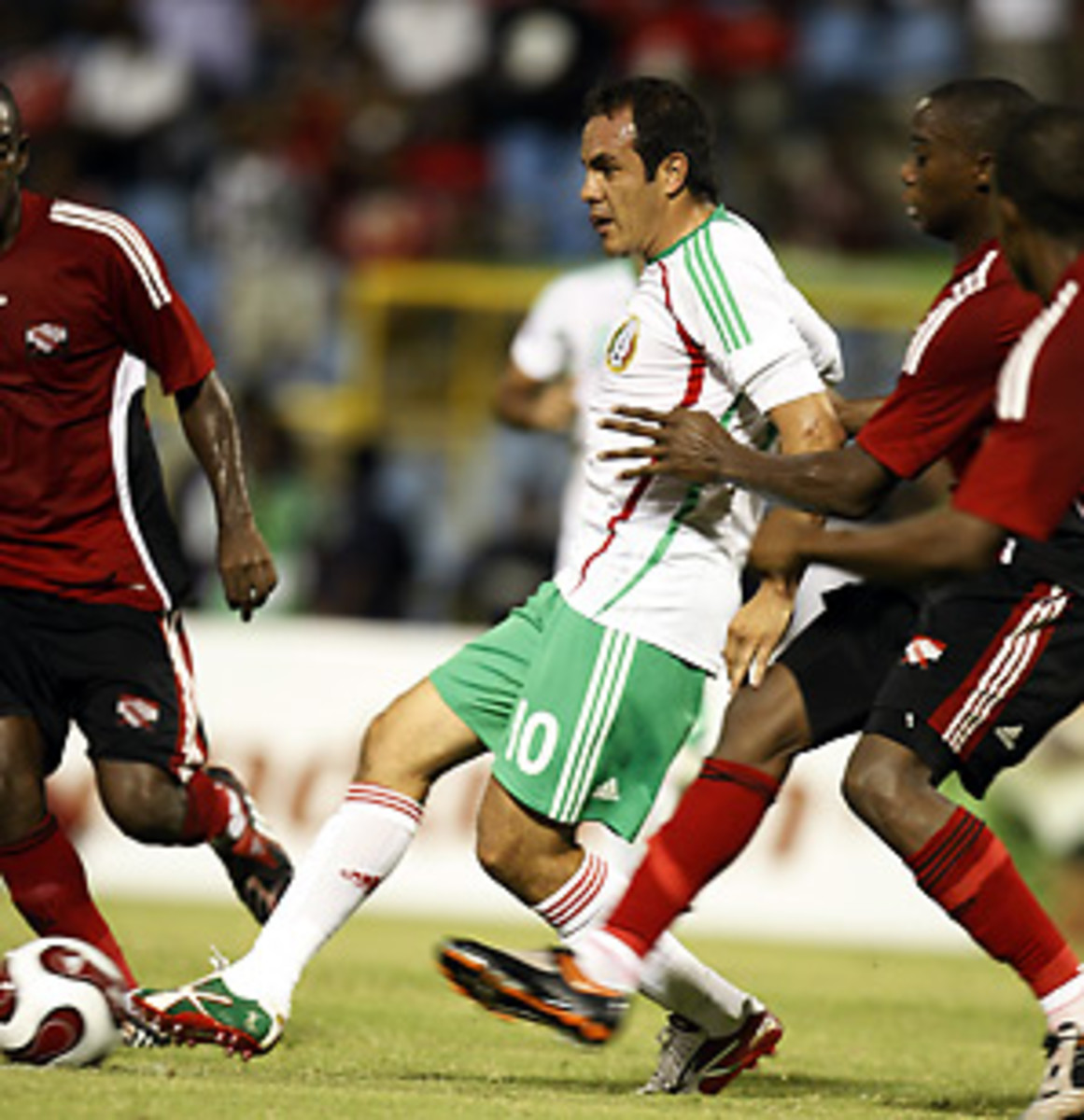Mexico fights on, eyes South Africa


In its most trying year since 2001, Mexico survived and came out stronger at the end because of it. By the midway point of the CONCACAF Hexagonal, El Tri had lost three World Cup qualifiers and fired its coach as panic was entrenched in the country. But Mexico went 4-0-1 down the stretch and wound up qualifying with relative ease after all was said and done.
And while the Hexagonal is now in the books and Mexico's focus is on the 2010 World Cup, there are some lessons learned throughout the 10-match odyssey that could help El Tri avoid some mistakes that threatened at one time to cost it the chance to play in South Africa:
Mexico's so-called "Golden Generation," the unfortunate pressure-filled name slapped on its 2005 Under-17 squad, had an impact on qualifying as several players have arrived on the scene. Giovani dos Santos fulfilled his own promise and was largely responsible for the turnaround, but another key player from Mexico's championship-winning youth squad that did damage was EfraínJuárez, whose contributions on the right side were invaluable. Juárez began the play that led to the game-winning goal against the U.S. in August and also helped create another goal in last month's win at Costa Rica.
Three others from the '05 squad also saw playing time during qualifying but none had a big impact. Carlos Vela hasn't yet joined dos Santos in terms of importance to El Tri, but injuries may have slowed his development. EnriqueEsqueda scored a goal in the finale, a 2-2 draw at Trinidad and Tobago on Wednesday, and seems poised to make a strong case for himself to be part of the World Cup team. Héctor Moreno, already a regular with Dutch club AZ Alkmaar, had the least impact with just one performance -- and a bad one in Trinidad at that -- to his credit.
Maybe the '05 U-17 squad won't be the backbone of the national team many had hoped for, but some elements of that team will be able to try and replicate some of their success on the global stage once more.
Cuauhtémoc Blanco retired from international soccer late last year, but when Mexico needed him most, he returned. The icon wasn't just another veteran contributing to the team; he was the heart and soul of the squad, one of the main reasons why Mexico was able to turn its campaign around. Blanco scored three goals in six Hexagonal matches as he continues to defy age.
After all, 36-year-olds aren't supposed to step into a high-paced international match and deliver immediately but that's what Blanco did. He turned back the clock to '01, when he performed similar acts of magic and helped lead that year's struggling Tri squad to the '02 World Cup. Blanco didn't earn Mexican fans' love by helping El Tri reach South Africa -- he won them over years ago. But he did present some strong arguments for being the best Mexican player ever, if he isn't already.
When Javier Aguirre took over and began planning the second half of the Hexagonal, he did some trimming. Gone from the squad were players like Pável Pardo, Oswaldo Sánchez, Antonio "Zinha" Naelson and MatíasVuoso. Save for Vuoso, all had played in the World Cup for Mexico and each continues to be a key player for his respective Mexican club. Add to that list the unavailability of Rafael Márquez, and such losses seemed grand, perhaps insurmountable.
But Aguirre tapped into the great depth Mexico has -- the best in CONCACAF -- and the team didn't miss the talent and experience of the absent players. In fact, Aguirre took it several steps further by reaching not only for young and upcoming players, but also to veterans who were deemed past their prime. Óscar Pérez came in and did well in his limited time, which included a 2-1 victory over Trinidad in June. Francisco Palencia was a surprise call late in the Hexagonal but was able to score a goal in the game that sent Mexico through to South Africa, a 4-1 rout of El Salvador on Oct. 10.
Mexico, of course, isn't immune to injury and may lose a player or two along the way to the World Cup. But even in the worst scenario, it will still be able to field a strong, talented and competitive squad.
Sitting in fifth place after four World Cup qualifying games, Mexico wasn't in the best position. But when the four teams in front are all CONCACAF teams, things were never as bad as they could have been. Climbing out of such a position in CONMEBOL or UEFA would be next to impossible, but CONCACAF's light competition helped get El Tri back on track.
Nobody in CONCACAF is still good enough to win in Estadio Azteca. While it's the biggest home-field advantage in the region, consider this: The last South American team to play in Azteca won, as Paraguay beat Mexico 1-0 in a friendly in '07.
As evidenced by some of the caliber of teams who will not play in the World Cup -- Sweden, Czech Republic, Croatia and Ecuador are all out -- the margin for error in CONCACAF is not anywhere near the razor-thin line other teams face elsewhere in the world. Geography is and continues to be on Mexico's side.
